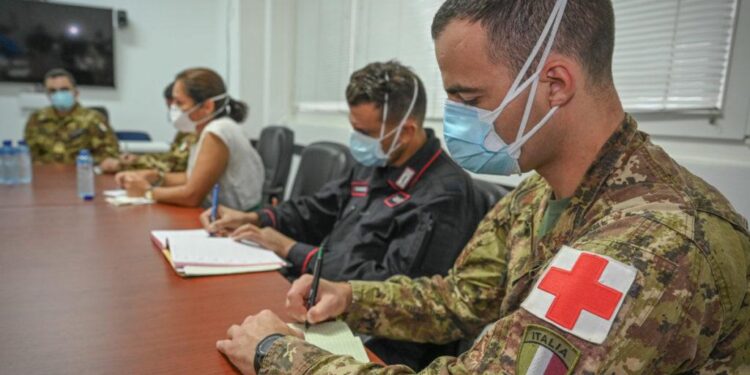Kosovo* is taking significant strides to enhance its health security by fostering intersectoral collaboration, with vital support from the World Health Organization (WHO). In a move aimed at bolstering the country’s capacity to prevent, detect, and respond to public health threats, various government sectors are joining forces to implement a coordinated approach. Backed by WHO expertise and resources, this partnership seeks to strengthen Kosovo’s health systems and safeguard the population against emerging and existing health risks.
Kosovo Enhances Disease Surveillance Systems to Boost Early Detection and Response
Kosovo is advancing its capacity to promptly identify and respond to infectious disease outbreaks by integrating cutting-edge surveillance technologies with strengthened coordination among health, agriculture, and environmental sectors. With technical guidance and financial support from the World Health Organization (WHO), new protocols have been established that emphasize real-time data sharing and rapid risk assessment. These efforts ensure that potential threats are detected earlier, permitting swift containment measures and minimizing public health impacts.
The multisectoral approach includes:
- Improved laboratory network connectivity for faster diagnostics
- Training programs for frontline health workers and epidemiologists
- Community engagement strategies to enhance reporting accuracy
- A centralized digital platform enabling unified outbreak monitoring
| Key Surveillance Metrics | 2019 | 2023 |
|---|---|---|
| Reporting Time (hours) | 48 | 12 |
| Outbreak Investigations Initiated | 30 | 65 |
| Laboratories Integrated | 5 | 14 |
Collaborative Framework Bridges Health and Agriculture Sectors for Comprehensive Risk Management
In a significant move to enhance national resilience, Kosovo* has established a dynamic collaboration between its health and agriculture sectors, facilitated by the World Health Organization (WHO). This intersectoral approach aims to address the complex challenges posed by zoonotic diseases, food safety, and environmental threats, which often transcend traditional sectoral boundaries. By fostering structured communication channels and shared protocols, the framework ensures early detection and response mechanisms are finely tuned to protect both human and animal health simultaneously.
The collaborative system leverages multiple strategic components including:
- Joint surveillance programs to monitor disease outbreaks and agricultural risks
- Integrated risk assessments combining epidemiological and ecological data
- Cross-sectoral training initiatives to strengthen workforce capacity
This coordination, backed by WHO’s technical guidance, enhances Kosovo’s ability to deploy cohesive risk management strategies, reduce public health threats, and secure food supply chains sustainably. The collaboration exemplifies a modern, holistic approach essential for health security in an interconnected world.
| Sector | Role | Key Activity |
|---|---|---|
| Health | Disease surveillance and outbreak response | Monitoring zoonoses & public health alerts |
| Agriculture | Food safety and livestock management | Implementing biosecurity and monitoring animal health |
| WHO | Technical support and capacity building | Providing guidelines and facilitating trainings |
WHO Advocates Strengthened Policy Integration and Capacity Building for Sustainable Health Security
In a decisive move towards enhancing its national health security framework, Kosovo* is partnering closely with the World Health Organization to embed sustainable, cross-sectoral policies that address emerging health challenges. This collaborative approach emphasizes the integration of health considerations into broader governmental strategies, fostering a dynamic policy environment where public health is prioritized across all relevant sectors. The initiative places capacity building at its core, enabling institutions to effectively anticipate, prepare for, and respond to public health risks, including pandemics and other biological threats.
Key elements of this strengthened approach include:
- Intersectoral coordination: Synchronizing efforts among health, agriculture, environment, and emergency services to streamline response mechanisms.
- Workforce enhancement: Training public health professionals to employ integrated risk assessment and management tools.
- Data-driven policies: Leveraging health information systems for evidence-based decision-making.
| Focus Area | Expected Outcome | WHO Support |
|---|---|---|
| Policy Integration | Unified health protocols across ministries | Technical guidance and framework development |
| Capacity Building | Skilled workforce with rapid response capabilities | Training programs and resource allocation |
| Surveillance Systems | Enhanced early-warning mechanisms | Data platform modernization |
Closing Remarks
As Kosovo continues to advance its health security framework through strengthened intersectoral collaboration, the partnership with the World Health Organization underscores a shared commitment to safeguarding public health. This cooperative approach not only enhances the country’s capacity to prevent and respond to health threats but also sets a precedent for regional health resilience. With ongoing WHO support, Kosovo is poised to build a more robust and integrated health system, ensuring better protection for its population now and in the future.













